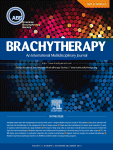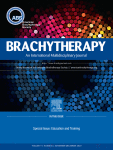To put some perspective for ARS, the science and data quality are critical if you are competing for a resident essay award and travel grant--these are generous awards. Agree it's not as important if you're just accepted for a poster.
Easy to demonize RSNA since it's primary DR and in Chicago every year when temperatures drop. I went just because I had family there. Nevertheless, 2 former ASTRO presidents were also president of RSNA (David Hussey and Sarah Donaldson) and there are RO tracks and more opportunities for oral presentations and moderating a session. The exhibit hall rocks with a ton of vendors and the atmosphere is pretty festive. So although the RO attendance is small, it again gives you a better chance to get to know your RO colleagues better and party with DR's. Unlike ACR which is heavy on health policy and advocacy, RSNA is more research oriented.
ACRO was Luther Brady's protest against the ACR (although he remained an active ACR member his whole life and attended their annual mtgs until his passing). It was also formed to address the lack of ASTRO's involvement in health policy, since ASTRO was heavily research oriented (of course, that's changed and ASTRO's come a long way). ACRO has stronger private practice membership and has provided lots of resources in terms of billing, coding, and policy (Ron DiGiamo of RevenueCycle is there every year and is a major supporter). Again, you get a smaller, more intimate meeting with the ability to network more intimately. They also offer travel grants to residents--based on the quality of the research. Nevertheless, the leadership within ACRO has been heavy on 21st C RO's, the reason why the mtgs are always in Florida (to serve all the 21st C practices on the Eastern seaboard. I miss the days when they would have mtgs on the west coast (2007 in Coronado Beach was awesome).
I would take San Antonio any day over an ASTRO mtg in New England. Boston in 2012 was a total disaster. A fall mtg, esp Oct, runs too close to winter storms in the NE. Both times I was in San Antonio, everything was within walking or Lime scooter distance. Food was great and there were plenty of venues outside the Riverwalk--if you're afraid of falling in. Hotel rooms were very affordable. I spent a fortune Ubering everywhere b/c everything in Chicago is so spread out. In any case, I wouldn't mind having a meeting in Denver (it's been a while--2005), New Orleans (1999?), Houston, Dallas, Las Vegas, Seattle--Eastern Standard Time is tough to adjust to. Los Angeles was a blast, and I'm always game for San Diego--easy to adjust to west coast time.




